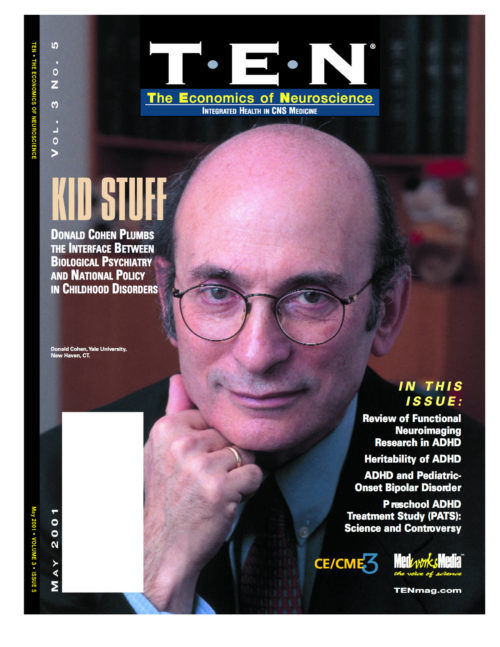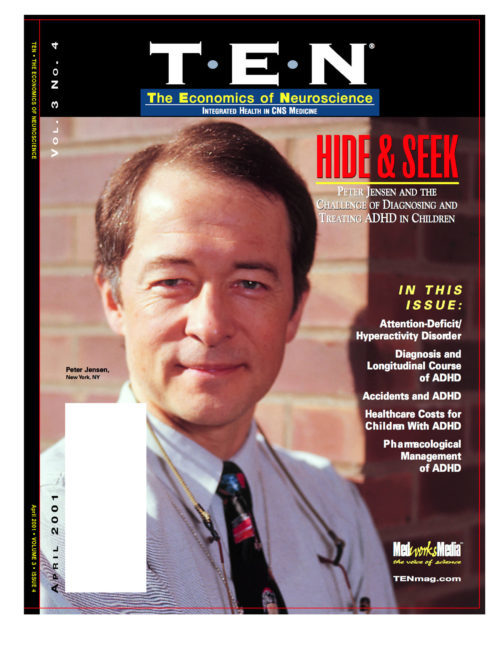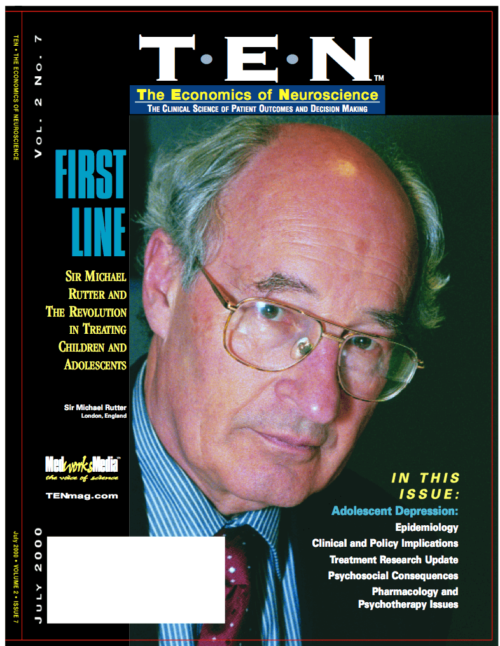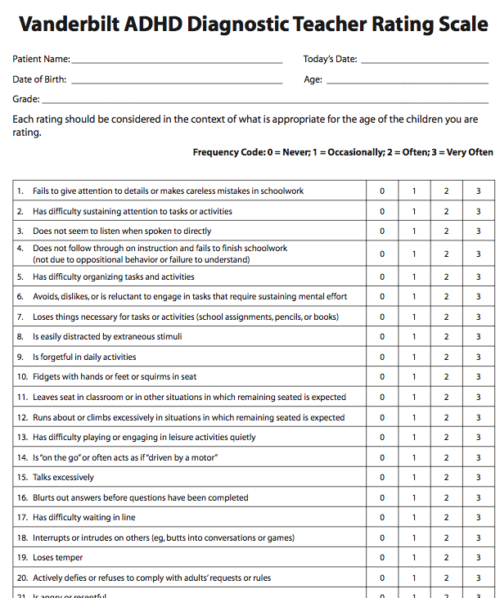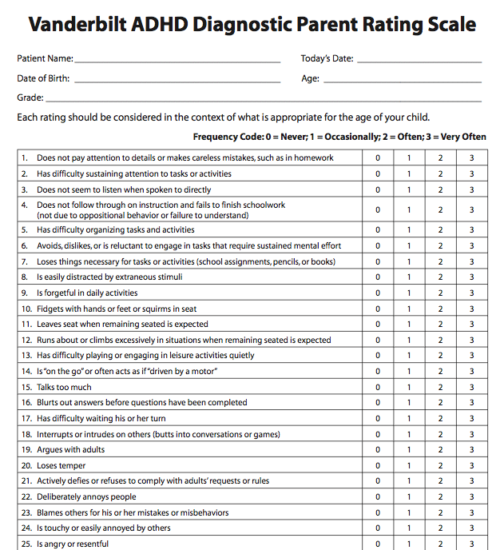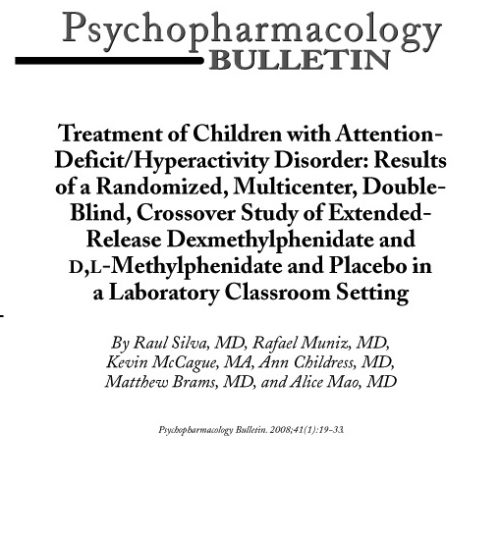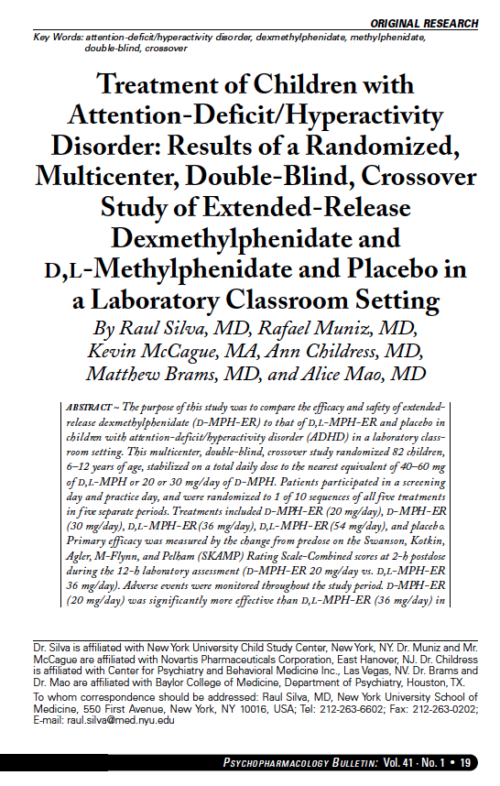ADHD (In Adults)
Adult attention-deficit/hyperactivity disorder (ADHD) is a mental health disorder that includes a combination of symptoms, such as difficulty paying attention, hyperactivity and impulsive behavior. Adult ADHD can lead to poor work or school performance, unstable relationships, low self-esteem, and other problems.
Symptoms generally start in early childhood and continue into adulthood. In some cases, ADHD is not recognized or diagnosed until the person is an adult. Adult ADHD symptoms may not be as clear as ADHD symptoms in children. In adults, hyperactivity may decrease, but struggles with impulsiveness, restlessness and difficulty paying attention may continue.
Treatment for adult ADHD is similar to treatment for childhood ADHD. Adult ADHD treatment includes medications, psychological counseling (psychotherapy) and treatment for any mental health conditions that occur along with ADHD. Some ADHD medications approved for children are not approved for adult use.
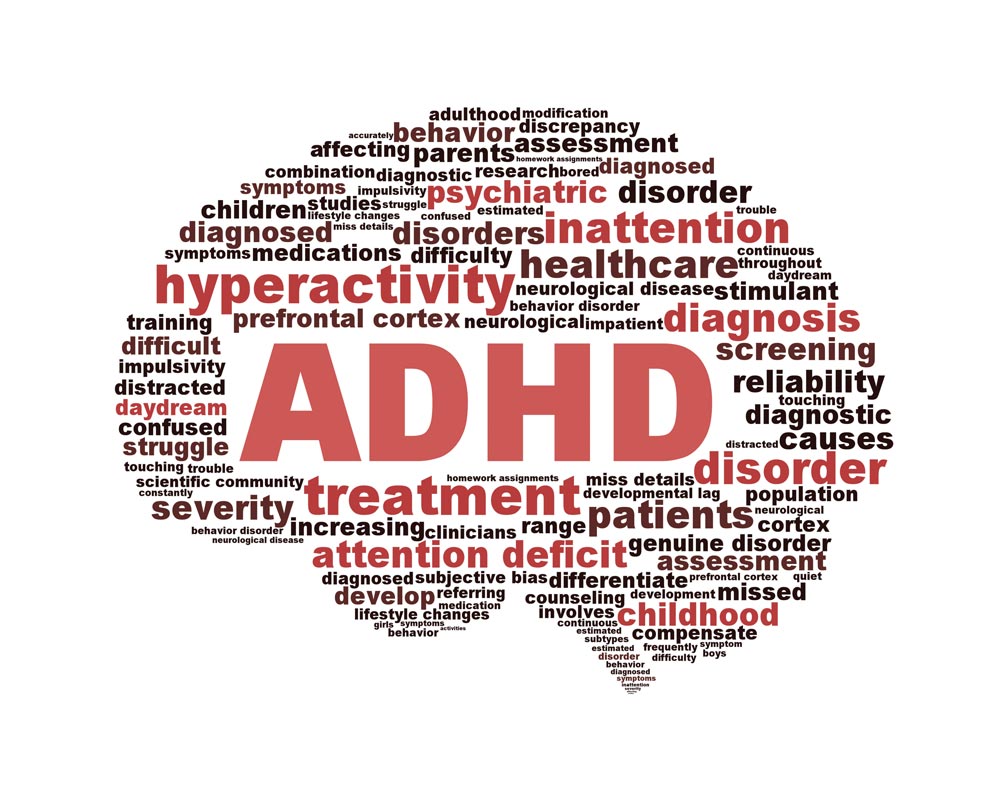
Symptoms
Some people with ADHD have fewer symptoms as they age, but some adults continue to have major symptoms that interfere with daily functioning. In adults, the main features of ADHD may include difficulty paying attention, impulsiveness and restlessness. Symptoms can range from mild to severe.
Many adults with ADHD aren’t aware they have it they just know that everyday tasks can be a challenge. Adults with ADHD may find it difficult to focus and prioritize, leading to missed deadlines and forgotten meetings or social plans. The inability to control impulses can range from impatience waiting in line or driving in traffic to mood swings and outbursts of anger.
Adult ADHD symptoms may include:
- Impulsiveness
- Problems focusing on a task
- Disorganization and problems prioritizing
- Poor time management skills
- Trouble multitasking
- Excessive activity or restlessness
- Poor planning
- Frequent mood swings
- Problems following through and completing tasks
- Hot temper
- Trouble coping with stress
- Low frustration tolerance
What’s normal and what’s ADHD?
Almost everyone has some symptoms similar to ADHD at some point in their lives. If your difficulties are recent or occurred only occasionally in the past, you probably don’t have ADHD. ADHD is diagnosed only when symptoms are severe enough to cause ongoing problems in more than one area of your life. These persistent and disruptive symptoms can be traced back to early childhood.
Diagnosis of ADHD in adults can be difficult because certain ADHD symptoms are similar to those caused by other conditions, such as anxiety or mood disorders. And many adults with ADHD also have at least one other mental health condition, such as depression or anxiety.
When to See a Doctor
If any of the symptoms listed above continually disrupt your life, talk to your doctor about whether you might have ADHD.
Seek a provider who has training and experience in caring for adults with ADHD.
Risk factors
Risk of ADHD may increase if:
- You have blood relatives, such as a parent or sibling, with ADHD or another mental health disorder
- Your mother smoked, drank alcohol or used drugs during pregnancy
- As a child, you were exposed to environmental toxins such as lead, found mainly in paint and pipes in older buildings
- You were born prematurely
Causes
While the exact cause of ADHD is not clear, research efforts continue. Factors that may be involved in the development of ADHD include:
- Genetics. ADHD can run in families, and studies indicate that genes may play a role.
- Environment. Certain environmental factors also may increase risk, such as lead exposure as a child.
- Problems during development. Problems with the central nervous system at key moments in development may play a role.
Complications
ADHD can make life difficult for you. ADHD has been linked to:
- Poor school or work performance
- Unemployment
- Trouble with the law
- Alcohol or other substance abuse
- Frequent car accidents or other accidents
- Unstable relationships
- Poor physical and mental health
- Poor self-image
- Suicide attempts
- Coexisting conditions
Although ADHD doesn’t cause other psychological or developmental problems, other disorders often occur along with ADHD and make treatment more challenging. These include:
Mood disorders. Many adults with ADHD also have depression, bipolar disorder or another mood disorder. While mood problems aren’t necessarily due directly to ADHD, a repeated pattern of failures and frustrations due to ADHD can worsen depression.
Anxiety disorders. Anxiety disorders occur fairly often in adults with ADHD. Anxiety disorders may cause overwhelming worry, nervousness and other symptoms. Anxiety can be made worse by the challenges and setbacks caused by ADHD.
Other psychiatric disorders. Adults with ADHD are at increased risk of other psychiatric disorders, such as personality disorders, intermittent explosive disorder and substance abuse.
Learning disabilities. Adults with ADHD may score lower on academic testing than would be expected for their age, intelligence and education. Learning disabilities can include problems with understanding and communicating.
Diagnosis
Signs and symptoms of ADHD in adults can be hard to spot. However, core symptoms start early in life before age 12 and continue into adulthood, creating major problems.
No single test can confirm the diagnosis. Making the diagnosis will likely include:
Physical exam, to help rule out other possible causes for your symptoms
Information gathering, such as asking you questions about any current medical issues, personal and family medical history, and the history of your symptoms
ADHD rating scales or psychological tests to help collect and evaluate information about your symptoms
Other conditions that resemble ADHD
Some medical conditions or treatments may cause signs and symptoms similar to those of ADHD.
Examples include:
Mental health disorders, including mood disorders such as depression or anxiety, conduct disorders, learning and language deficits, or other psychiatric disorders.
Medical problems that can affect thinking or behavior, such as a developmental disorder, seizure disorder, thyroid problems, sleep disorders, lead poisoning, brain injury or low blood sugar (hypoglycemia)
Drugs and medications, such as alcohol or other substance abuse and certain medications.
Treatment
Standard treatments for ADHD in adults typically involve medication, education, training and psychological counseling. A combination of these is often the most effective treatment. These treatments can relieve many symptoms of ADHD, but they don’t cure it. It may take some time to determine what works best for you.
Medications
Talk with your doctor about the benefits and risks of any medications.
Stimulants, such as products that include methylphenidate or amphetamine, are typically the most commonly prescribed medications for ADHD, but other drugs may be prescribed. Stimulants appear to boost and balance levels of brain chemicals called neurotransmitters.
Other medications used to treat ADHD include the nonstimulant atomoxetine (Strattera) and certain antidepressants such as bupropion (Wellbutrin, others). Atomoxetine and antidepressants work slower than stimulants do, but these may be good options if you can’t take stimulants because of health problems or a history of substance abuse or if stimulants cause severe side effects.
The right medication and the right dose vary among individuals, so it may take time to find out what’s right for you. Tell your doctor about any side effects.
Psychological counseling
Counseling for adult ADHD generally includes psychological counseling (psychotherapy), education about the disorder and learning skills to help you be successful.
Psychotherapy may help you:
- Improve your time management and organizational skills
- Learn how to reduce your impulsive behavior
- Develop better problem-solving skills
- Cope with past academic, work or social failures
- Improve your self-esteem
- Learn ways to improve relationships with your family, co-workers and friends
- Develop strategies for controlling your temper
Common types of psychotherapy for ADHD include:
Cognitive behavioral therapy. This structured type of counseling teaches specific skills to manage your behavior and change negative thinking patterns into positive ones. It can help you deal with life challenges, such as school, work or relationship problems, and help address other mental health conditions, such as depression or substance abuse.
Marital counseling and family therapy. This type of therapy can help loved ones cope with the stress of living with someone who has ADHD and learn what they can do to help. Such counseling can improve communication and problem-solving skills.
Working on relationships
If you’re like many adults with ADHD, you may be unpredictable and forget appointments, miss deadlines, and make impulsive or irrational decisions. These behaviors can strain the patience of the most forgiving co-worker, friend or partner.
Therapy that focuses on these issues and ways to better monitor your behavior can be very helpful. So can classes to improve communication and develop conflict resolution and problem-solving skills. Couples therapy and classes in which family members learn more about ADHD may significantly improve your relationships.
Alternative medicine
There’s little research to indicate that alternative medicine treatments can reduce ADHD symptoms. However, one recent study indicates that mindfulness meditation may help improve mood and attention in adults who have ADHD, as well as those who don’t have ADHD.
Before using alternative interventions for ADHD, talk with your doctor about risks and possible benefits.
ADHD (In Children)
Attention-deficit/hyperactivity disorder (ADHD) is a chronic condition that affects millions of children and often continues into adulthood. ADHD includes a combination of persistent problems, such as difficulty sustaining attention, hyperactivity and impulsive behavior.
Children with ADHD also may struggle with low self-esteem, troubled relationships and poor performance in school. Symptoms sometimes lessen with age. However, some people never completely outgrow their ADHD symptoms. But they can learn strategies to be successful.
While treatment won’t cure ADHD, it can help a great deal with symptoms. Treatment typically involves medications and behavioral interventions. Early diagnosis and treatment can make a big difference in outcome.
Symptoms
The primary features of attention-deficit/hyperactivity disorder include inattention and hyperactive-impulsive behavior. ADHD symptoms start before age 12, and in some children, they’re noticeable as early as 3 years of age. ADHD symptoms can be mild, moderate or severe, and they may continue into adulthood.
ADHD occurs more often in males than in females, and behaviors can be different in boys and girls. For example, boys may be more hyperactive and girls may tend to be quietly inattentive.
There are three subtypes of ADHD:
- Predominantly inattentive. The majority of symptoms fall under inattention.
- Predominantly hyperactive-impulsive. The majority of symptoms are hyperactive and impulsive.
- Combined. The most common type in the U.S., this is a mix of inattentive symptoms and hyperactive-impulsive symptoms.
Inattention
A child who shows a pattern of inattention may often:
- Fail to pay close attention to details or make careless mistakes in schoolwork
- Have trouble staying focused in tasks or play
- Appear not to listen, even when spoken to directly
- Have difficulty following through on instructions and fail to finish schoolwork or chores
- Have trouble organizing tasks and activities
- Avoid or dislike tasks that require focused mental effort, such as homework
- Lose items needed for tasks or activities, for example, toys, school assignments, pencils
- Be easily distracted
- Forget to do some daily activities, such as forgetting to do chores
Hyperactivity and impulsivity
A child who shows a pattern of hyperactive and impulsive symptoms may often:
- Fidget with or tap his or her hands or feet, or squirm in the seat
- Have difficulty staying seated in the classroom or in other situations
- Be on the go, in constant motion
- Run around or climb in situations when it’s not appropriate
- Have trouble playing or doing an activity quietly
- Talk too much
- Blurt out answers, interrupting the questioner
- Have difficulty waiting for his or her turn
- Interrupt or intrude on others’ conversations, games or activities
Additional issues
In addition, a child with ADHD has:
- Symptoms for at least six months
- Several symptoms that negatively affect school, home life or relationships in more than one setting, such as at home and at school
- Behaviors that aren’t normal for children the same age who don’t have ADHD
Normal behavior vs. ADHD
Most healthy children are inattentive, hyperactive or impulsive at one time or another. It’s normal for preschoolers to have short attention spans and be unable to stick with one activity for long. Even in older children and teenagers, attention span often depends on the level of interest.
The same is true of hyperactivity. Young children are naturally energetic they often are still full of energy long after they’ve worn their parents out. In addition, some children just naturally have a higher activity level than others do. Children should never be classified as having ADHD just because they’re different from their friends or siblings.
Children who have problems in school but get along well at home or with friends are likely struggling with something other than ADHD. The same is true of children who are hyperactive or inattentive at home, but whose schoolwork and friendships remain unaffected.
When to see a doctor
If you’re concerned that your child shows signs of ADHD, see your pediatrician or family doctor. Your doctor may refer you to a specialist, but it’s important to have a medical evaluation first to check for other possible causes of your child’s difficulties.
Causes
While the exact cause of attention-deficit/hyperactivity disorder is not clear, research efforts continue. Factors that may be involved in the development of ADHD include:
- Genetics. ADHD can run in families, and studies indicate that genes may play a role.
- Environment. Certain environmental factors, such as lead exposure, may increase risk.
- Development. Problems with the central nervous system at key moments in development may play a role.
Risk factors
Risk factors for attention-deficit/hyperactivity disorder may include:
- Blood relatives, such as a parent or sibling, with ADHD or another mental health disorder
- Exposure to environmental toxins such as lead, found mainly in paint and pipes in older buildings
- Maternal drug use, alcohol use or smoking during pregnancy
- Premature birth
Although sugar is a popular suspect in causing hyperactivity, there’s no reliable proof of this. Many issues in childhood can lead to difficulty sustaining attention, but that’s not the same as ADHD.
Complications
Attention-deficit/hyperactivity disorder can make life difficult for children. Children with ADHD:
- Often struggle in the classroom, which can lead to academic failure and judgment by other children and adults
- Tend to have more accidents and injuries of all kinds than do children who don’t have ADHD
- Tend to have poor self-esteem
- Are more likely to have trouble interacting with and being accepted by peers and adults
- Are at increased risk of alcohol and drug abuse and other delinquent behavior
Coexisting conditions
ADHD doesn’t cause other psychological or developmental problems. However, children with ADHD are more likely than others to also have conditions such as:
- Learning disabilities, including problems with understanding and communicating
- Anxiety disorders, which may cause overwhelming worry, nervousness
- Depression, which frequently occurs in children with ADHD
- Disruptive mood dysregulation disorder, characterized by irritability and problems tolerating frustration
- Oppositional defiant disorder (ODD), generally defined as a pattern of negative, defiant and hostile behavior toward authority figures
- Conduct disorder, marked by antisocial behavior such as stealing, fighting, destroying property, and harming people or animals
- Bipolar disorder, which includes depression as well as manic behavior
- Tourette syndrome, a neurological disorder characterized by repetitive muscle or vocal tics
Diagnosis
In general, a child shouldn’t receive a diagnosis of attention-deficit/hyperactivity disorder unless the core symptoms of ADHD start early in life before age 12 and create significant problems at home and at school on an ongoing basis.
There’s no specific test for ADHD, but making a diagnosis will likely include:
- Medical exam, to help rule out other possible causes of symptoms
- Information gathering, such as any current medical issues, personal and family medical history, and school records
- Interviews or questionnaires for family members, your child’s teachers or other people who know your child well, such as baby sitters and coaches
- ADHD criteria from the Diagnostic and Statistical Manual of Mental Disorders DSM-5, published by the American Psychiatric Association
- ADHD rating scales to help collect and evaluate information about your child
Diagnosing ADHD in young children
Although signs of ADHD can sometimes appear in preschoolers or even younger children, diagnosing the disorder in very young children is difficult. That’s because developmental problems such as language delays can be mistaken for ADHD.
So children preschool age or younger suspected of having ADHD are more likely to need evaluation by a specialist, such as a psychologist or psychiatrist, speech pathologist, or developmental pediatrician.
Other conditions that resemble ADHD
A number of medical conditions or their treatments may cause signs and symptoms similar to those of ADHD. Examples include:
- Learning or language problems
- Mood disorders such as depression or anxiety
- Other psychiatric disorders
- Seizure disorders
- Vision or hearing problems
- Tourette syndrome
- Medical problems that affect thinking or behavior
- Sleep disorders
- Thyroid problems
- Substance abuse
- Brain injury
Treatment
Standard treatments for attention-deficit/hyperactivity disorder in children include medications, education, training and counseling. These treatments can relieve many of the symptoms of ADHD, but they don’t cure it. It may take some time to determine what works best for your child.
Stimulant medications
Currently, stimulant drugs (psychostimulants) are the most commonly prescribed medications for ADHD. Stimulants appear to boost and balance levels of brain chemicals called neurotransmitters. These medications help improve the signs and symptoms of inattention and hyperactivity sometimes effectively in a short period of time.
Examples include:
Amphetamines. These include dextroamphetamine (Dexedrine), dextroamphetamine-amphetamine (Adderall) and lisdexamfetamine (Vyvanse).
Methylphenidates. These include methylphenidate (Concerta, Metadate, Ritalin, others) and dexmethylphenidate (Focalin)
Stimulant drugs are available in short-acting and long-acting forms. A long-acting patch of methylphenidate (Daytrana) is available that can be worn on the hip.
The right dose varies from child to child, so it may take some time to find the correct dose. And the dose may need to be adjusted if significant side effects occur or as your child matures. Ask your doctor about possible side effects of stimulants.
Stimulant medications and heart problems
Although rare, several heart-related deaths have occurred in children and teenagers taking stimulant medications. The possibility of increased risk of sudden death is still unproved, but if it exists, it’s believed to be in people who already have underlying heart disease or a heart defect.
Your child’s doctor should make sure your child doesn’t have any signs of a heart condition and should ask about family risk factors for heart disease before prescribing a stimulant medication.
Other medications
Other medications that may be effective in treating ADHD include:
- Atomoxetine (Strattera)
- Antidepressants such as bupropion (Wellbutrin, others)
- Guanfacine (Intuniv, Tenex)
- Clonidine (Catapres, Kapvay)
Atomoxetine and antidepressants work slower than stimulants do and may take several weeks before they take full effect. These may be good options if your child can’t take stimulants because of health problems or if stimulants cause severe side effects.
Ask your doctor about possible side effects of any medications.
Suicide risk
Although it remains unproved, concerns have been raised that there may be a slightly increased risk of suicidal thinking in children and teenagers taking nonstimulant ADHD medication or antidepressants. Contact your child’s doctor if you notice any signs of suicidal thinking or other signs of depression.
Giving medications safely
It’s very important to make sure your child takes the right amount of the prescribed medication. Parents may be concerned about stimulants and the risk of abuse and addiction. Dependence hasn’t been shown in children who take these drugs for appropriate reasons and at the proper dose.
On the other hand, there’s concern that other people might misuse or abuse stimulant medication prescribed for children and teenagers with ADHD. To keep your child’s medications safe and to make sure your child is getting the right dose at the right time:
- Give medications carefully. Children and teens shouldn’t be in charge of their own ADHD medication without proper supervision.
- At home, keep medication locked in a childproof container. An overdose of stimulant drugs is serious and potentially fatal.
- Don’t send supplies of medication to school with your child. Deliver any medicine yourself to the school nurse or health office.
- ADHD behavior therapy
Children with ADHD often benefit from behavior therapy and counseling, which may be provided by a psychiatrist, psychologist, social worker or other mental health care professional. Some children with ADHD may also have other conditions such as anxiety disorder or depression. In these cases, counseling may help both ADHD and the coexisting problem.
Examples of therapy include:
Behavior therapy. Teachers and parents can learn behavior-changing strategies, such as token reward systems and timeouts, for dealing with difficult situations.
Psychotherapy. This allows older children with ADHD to talk about issues that bother them, explore negative behavioral patterns and learn ways to deal with their symptoms.
Parenting skills training. This can help parents develop ways to understand and guide their child’s behavior.
Family therapy. Family therapy can help parents and siblings deal with the stress of living with someone who has ADHD.
Social skills training. This can help children learn appropriate social behaviors.
Ongoing treatment
The best results occur when a team approach is used, with teachers, parents, and therapists or physicians working together. Educate yourself about ADHD, and then work with your child’s teachers and refer them to reliable sources of information to support their efforts in the classroom.
If your child is being treated for ADHD, he or she should see the doctor regularly until symptoms have largely improved, and then every three to four months if symptoms are stable.
Call the doctor if your child has any medication side effects, such as loss of appetite, trouble sleeping or increased irritability, or if your child’s ADHD has not shown much improvement with initial treatment.
Alternative medicine
There’s little research that indicates that alternative medicine treatments can reduce attention-deficit/hyperactivity disorder symptoms. Before considering any alternative interventions, talk with your doctor to determine if the therapy is safe. Some alternative medicine treatments that have been tried, but are not yet fully proved scientifically, include:
Yoga or meditation. Doing regular yoga routines or meditation and relaxation techniques may help children relax and learn discipline, which may help them manage their symptoms of ADHD.
Special diets. Most diets promoted for ADHD involve eliminating foods thought to increase hyperactivity, such as sugar, and common allergens such as wheat, milk and eggs. Some diets recommend avoiding artificial food colorings and additives. So far, studies haven’t found a consistent link between diet and improved symptoms of ADHD, though some anecdotal evidence suggests diet changes might make a difference. Caffeine use as a stimulant for children with ADHD can have risky effects and is not recommended.
Vitamin or mineral supplements. While certain vitamins and minerals from foods are necessary for good health, there’s no evidence that supplemental vitamins or minerals can reduce symptoms of ADHD. “Megadoses” of vitamins doses that far exceed the Recommended Dietary Allowance (RDA) can be harmful.
Herbal supplements. There is no evidence to suggest that herbal remedies help with ADHD, and some may be harmful.
Proprietary formulations. These are products made from vitamins, micronutrients and other ingredients that are sold as possible treatment supplements for children with ADHD. These products have had little or no research and are exempt from Food and Drug Administration oversight, making them possibly ineffective or potentially harmful.
Essential fatty acids. These fats, which include omega-3 oils, are necessary for the brain to function properly. Researchers are still investigating whether these may improve ADHD symptoms.
Neurofeedback training. Also called electroencephalographic (EEG) biofeedback, in these sessions a child focuses on certain tasks while using a machine that shows brain wave patterns. The goal is to learn to keep brain wave patterns active in the front of the brain, improving symptoms of ADHD. More research is needed to see if this works.
Exercise. In addition to its health benefits, regular exercise may have a positive effect on behavior in children with ADHD when added to treatment.


